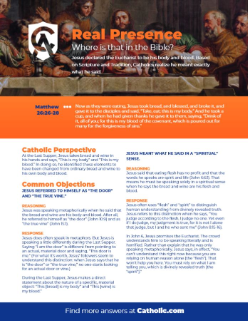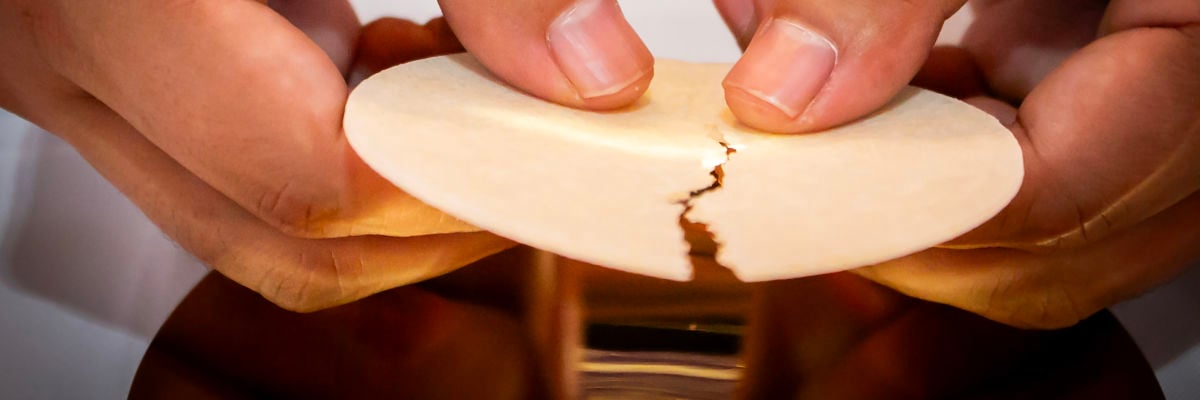
The Holy Eucharist is the “source and summit of the Christian life,” according to the Catechism of the Catholic Church (CCC 1324).
The Eucharist Is Not a Symbol: Beyond Symbolism
Jesus is substantially present—body, blood, soul, and divinity—in Holy Communion. People may misunderstand and believe that the Eucharist is only a symbol of the body and blood of Christ. It is much more than that.
Catholics often refer to this as the Real Presence of Jesus in the Eucharist. Think of the Real Presence as the core of what the Eucharist is: in other words, its “substance.” In addition, after the consecration, look at the bread and wine as external characteristics or “accidents” that visibly endure without change; aspects like color, size, shape, or any other observable feature.
In offering the Sacrament of the Eucharist, the substance of bread and wine change into the body and blood of Christ, while the accidents (taste, appearance, etc.) remain unchanged.
What Is Communion?
Holy Communion is the practice of receiving the Sacrament of the Eucharist. The Catholic Encyclopedia states,
“The Eucharist is the Real Presence of God, Jesus Christ, body and blood, under the appearances of bread and wine.”
When we go to Communion as Catholics, not only are we receiving Jesus fully the Sacrament, but we are also stating that we believe and profess all that the holy Catholic Church believes, teaches and proclaims to be revealed by God. By doing so, we are proclaiming the objective sacramental reality and the subjective act of faith and communion with the Catholic Church.
Free Download | The Eucharist: Where Is that in the Bible?

Who Can Receive Communion?
The answer to the above question is more important than you think. This information will help you know whether you should receive Communion.
Participating in Communion is an act of love for Christ. You are receiving Christ into your heart and soul. The Catechism says, “By this sacrament we unite ourselves to Christ, who makes us sharers in his body and blood to form a single body” (1331).
Holy Communion is for practicing Catholics who are in a state of grace, and who believe in the Real Presence of Jesus Christ in the Eucharist. Additionally, you must be in union with the teachings of the Catholic Church. This is important to note: even though some Protestant denominations may hold to some belief in the Real Presence in the Eucharist, the Catholic Church does not practice intercommunion. Only those received into full communion with the Catholic Church may share at the Eucharistic table.
The key term here is “union” or “unity,” and so you can think of the Eucharist as a sacramental communion with Jesus Christ that profoundly deepens our unity with him and each other as members of his Church. In receiving the Holy Eucharist and saying, “Amen,” Catholics reaffirm our belief in—and renew our union with—Christ, his Church, and all the teachings Jesus gives us through his Church. So to receive the Eucharist, you are to fully agree with all the Church’s teachings, even if you’re struggling with that belief (see Mark 9:21–29). Jesus Christ himself gives us these teachings, so it is important to be in harmony with them.
The Catholic Church provides guidelines on receiving the Eucharist. For details, see our article “Who Can Receive Holy Communion?”
What Is the Definition of the Eucharist?
The term “Eucharist” comes from the Greek word eucharistia, which means “thanksgiving.” In Catholic Tradition, the Eucharist is a sacrament—and sacrifice—of thanksgiving and communion. We gather at Mass and Holy Communion to express gratitude to Jesus for his sacrifice on the Cross, and to offer anew that one sacrifice under the forms of bread and wine.
Receiving the Eucharist unites us more closely as the body of Christ within the Church.
St. Paul emphasizes that the Church is one body (see 1 Cor. 12:12–30). Through the consecrated bread, we become the body of Christ. “Since there is (only) one bread, we though many are actually one body because we all share in the one bread.” (1 Cor. 10:17; see 10:14–22).
The one body—and divine Person—of Jesus Christ has the power to make us one. We the Church are one body because we are the mystical body of Jesus Christ in the world today.
Acting in the Person of Christ
During the celebration of the Eucharist the priest, acting in the person of Christ (in persona Christi), “re-presents (makes present) the sacrifice of the cross” under the sacramental forms of bread and wine (CCC 1366). This is the sacrifice of the Mass.
During Holy Mass, the priest wears clothes called “vestments” to show he represents Christ, not himself. The priest reflects an image of Christ, who is the “high priest of the New Covenant” (CCC 1348). When a priest offers the Eucharist, he uniquely and most powerfully makes Jesus present to and for the benefit of the faithful, and the world at large as well.
The Body, Blood, and Soul of Christ
Catholics believe that, during the Holy Eucharist, we receive not just symbols but the actual body, blood, soul, and divinity of Christ. More than a mere sign, it is the living Christ we receive. The bread and wine become the actual body and blood of the resurrected Jesus Christ through the consecration.
Sacrifice of the Cross: Celebrating Redemption
The celebration of the Eucharist makes present the sacrifice of the cross. Jesus offered his body and blood on the cross to save humanity. We don’t repeat or multiply his one sacrifice at Mass, but we do powerfully offer it anew.
The Eucharist re-presents Christ’s one sacrifice. When the priest speaks the special words, he makes present—and we join ourselves in offering anew to our Father in heaven—Jesus’ redemptive sacrifice. This participation makes the Eucharist a holy and saving action.
Words of Christ: A Promise of Eternal Life
We have the words of institution from Jesus Christ himself at the Last Supper: “Take and eat, this is my body” and “Drink from it, all of you, for this is my blood” (Matt. 26:26–28).
This offering renews our unity with God. Through these words, Christ gives us eternal life by giving us himself. He invites us to join in—and partake of—his sacrifice, so that we can share everlasting life in heaven with him.
The Role of the Holy Spirit
The Holy Spirit plays a pivotal role in the celebration of the Eucharist. Through the power of the Holy Spirit, the bread and wine become the Body and Blood of Christ:
“The power of the words and the action of Christ, and the power of the Holy Spirit, make sacramentally present under the species of bread and wine Christ’s body and blood, his sacrifice offered on the cross once for all” (CCC 1353).
Council of Trent: Defining Catholic Doctrine
In the sixteenth century, the Council of Trent solidified the Catholic Church’s teachings on the Eucharist. This council reaffirmed the real presence of Christ in the Eucharist. The clarifying doctrines from the Council of Trent remain fundamental to the Catholic faith today. Christ is truly present in the Blessed Sacrament and we can share our belief in the Eucharist with confidence.
What Did Jesus Say About the Eucharist?
While the substance of the bread and wine changes in the Eucharist, the appearances remain the same. This phenomenon, known as transubstantiation, highlights the miraculous nature of the sacrament. Despite no visible change, we believe—because of Christ’s own words (John 6:47–58)—that the Eucharist is the real and substantial presence of Jesus.
Eucharistic Miracles: Divine Signs
Throughout history, there have been accounts of Eucharistic miracles, in which the consecrated bread and wine have visibly taken on the properties of real human flesh and blood. Many believe these events provide more evidence that Jesus Christ is present in the Eucharist. The Church’s official teachings do not depend on these miracles, and yet their wondrous existence further points to the divine mystery and sanctity of the sacrament.
Eucharistic Revival: Nourishing the Faithful
Catholic Answers joined thousands in Indianapolis in July 2024. Trent Horn signed books, Joe Heschmeyer and Cy Kellett took questions from the floor for a unique episode of Catholic Answers Live, and we provided books at deeply discounted prices to help attendees grow in their understanding of the Eucharist.
An emphasis on Eucharistic revival is growing within the Catholic Church. The movement seeks to deepen our understanding of the Eucharist and rekindle a fervent devotion to the Blessed Sacrament. The Eucharist is the center of the Catholic Church because, at every Mass, we sacramentally renew Christ’s one sacrifice of the Cross. This is the source of Catholic life, and then we receive him in Holy Communion, which anticipates the summit of Catholic worship in heaven (Rev. 19:9). Jesus Christ is the center (and summit) of Catholic life and worship. His body and blood nourish us every time we receive the Eucharist.
Pope Francis Exhorts Us to Live a Eucharistic Life:
The Eucharist is the sacrament of Communion, which brings us out from individualism to live together our journey in his footsteps, our faith in him.
We ought, therefore, to ask ourselves before the Lord: How do I live the Eucharist? Do I live it anonymously or as a moment of true communion with the Lord, [and] also with many brothers and sisters who share this same table? How are our eucharistic celebrations? . . .
Let us pray that participation in the Eucharist moves us always to follow the Lord every day, to be instruments of communion, to share with him and with our neighbor who we are. Then our lives will be truly fruitful. Amen.
Additional resources on the Eucharist:
The Eucharist Is Really Jesus
Catholic Answers apologist Joe Heschmeyer explains how belief in the Eucharist is biblical and reasonable, and how knowing that the Eucharist is really Jesus becomes a master key to understanding the essential aspects of our lifelong walk with him.
20 Answers: The Eucharist
This booklet will help you understand the main arguments for the Real Presence of Christ in the Eucharist, and how to answer the most common objections to this central teaching of the Catholic Church.
Bible Navigator: Real Presence
Have you ever faced a challenge to your Catholic beliefs? Explore the biblical basis for Catholic beliefs effortlessly, with Catholic Answers Bible Navigator. Gain insights into the real presence of the Holy Eucharist and strengthen your understanding of the sacrificial nature of the Mass.
Q & A: Isn’t the Eucharist just symbolic?
Find fast and easy answers to your questions with our apologist-trusted responses.


